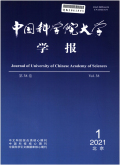中国科学院大学学报2024,Vol.41Issue(3):357-364,8.DOI:10.7523/j.ucas.2022.065
基于BBO优化K-means算法的WSN分簇路由算法
Clustering routing algorithm for WSN based on BBO optimized K-means
摘要
Abstract
Aimed at the problems of limited energy and short network lifetime in wireless sensor network,BBOK-GA based on biogeographic algorithm optimization K-means was proposed.In the clustering stage,biogeographic algorithm optimization K-means was firstly used to prevent K-means from falling into the local optimum.According to the energy factor and distance factor,a new fitness function was designed to select optimal cluster heads and complete the clustering.And genetic algorithm was used to search the optimal routing path towards base station for cluster heads.The simulation results indicate that BBOK-GA reduces the network energy consumption,increases the network throughput and extends the network life time compared to LEACH,LEACH-C,and K-GA.关键词
无线传感器网络/生物地理学优化算法/遗传算法/K-means算法/分簇路由Key words
wireless sensor network/biogeography-based optimization/genetic algorithm/K-means algorithm/clustering-based routing分类
信息技术与安全科学引用本文复制引用
彭程,谭冲,刘洪,郑敏..基于BBO优化K-means算法的WSN分簇路由算法[J].中国科学院大学学报,2024,41(3):357-364,8.基金项目
国家重点研发计划(2020YFB2103300)资助 (2020YFB2103300)

